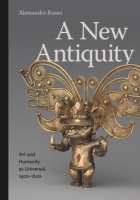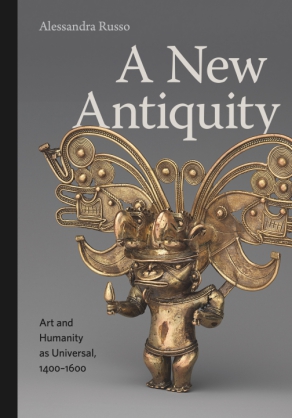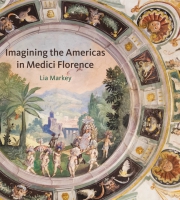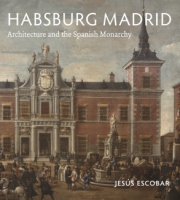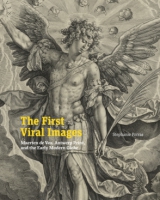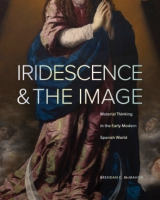A New Antiquity
Art and Humanity as Universal, 1400–1600
Alessandra Russo
Winner of the 2025 Eleanor Tufts Award from the Society for Iberian Global Art“A radical new theoretical approach that inextricably merges the New World into the Old. . . . Russo powerfully demonstrates how purposefully engaging with the conceptual contradictions of colonial expansion broadens our understanding of the art and thought of the early modern period, and she invites the next generation of scholars to join her in this work.”
- Description
- Reviews
- Bio
- Table of Contents
- Sample Chapters
- Subjects
Centering her study on a vast corpus of early modern textual and visual sources, Russo contends that the subtlety and inventiveness of the myriad of American, Asian, and African creations that were pillaged, exchanged, and often eventually destroyed in the context of Iberian colonization—including sculpture, painting, metalwork, mosaic, carving, architecture, and masonry—actually challenged and revolutionized sixteenth-century European definitions of what art is and what it means to be human. In this way, artifacts coming from outside Europe between 1400 and 1600 played a definitive role in what are considered distinctively European transformations: the redefinition of the frontier between the “mechanical” and the “liberal” arts and a new conception of the figure of the artist.
Original and convincing, A New Antiquity is a pathbreaking study that disrupts existing conceptions of Renaissance art and early modern humanity. It will be required reading for art historians specializing in the Renaissance, scholars of Iberian and Latin American cultures and global studies, and anyone interested in anthropology and aesthetics.
“A radical new theoretical approach that inextricably merges the New World into the Old. . . . Russo powerfully demonstrates how purposefully engaging with the conceptual contradictions of colonial expansion broadens our understanding of the art and thought of the early modern period, and she invites the next generation of scholars to join her in this work.”
“Far more than the cultivation of the self through literary pursuits, humanitas according to [Russo’s] sweeping redefinition is manifest both in the ingenium of artistic making and—more implicitly—in the recognition of the humanity of art, wherever it comes from. . . . It is in making the case for empathy, upholding the urgency with which her early modern witnesses linked the recognition of human ingenium with the human dignity of New World inhabitants, that Russo’s project appears most original and highly necessary.”
“Here at last is a book affirming that non-European art really was art—discussed in terms of pathos, beauty, and (rational) form—so much so that it made the universalization of the concept possible in the first place… Consistently generous and clever…Russo’s intervention is a gift.”
“Presents a different, anticanonical type of art theory that offers a more diversified view of European aesthetics and artistic value.”
“A New Antiquity: Art and Humanity as Universal, 1400-1600 is an impressively seminal and ground-breaking study that will compel a rethinking of the heretofore existing conceptions of Renaissance art and early modern humanity.”
“Alessandra Russo fully restores the centrality of the plural notion of antiquity to the age of the first global interactions. Her reading of a range of writings by humanists, explorers, and missionaries subverts traditional accounts of the Renaissance and reveals how the material encounter with cultures and societies around the world led Europeans to theorize art as universal and redefine the human condition on this basis.”
“Alessandra Russo’s indispensable book excavates an early modern moment when the skill and exquisite beauty manifest in art objects from around the globe served as an argument for an ethics of universal humanity. Without losing sight of the violence of European colonialism, Russo mobilizes perceptive close readings of aesthetic encounters to reveal a countertradition that has much to teach us today. This deeply researched and eloquent undertaking promises to reorient fundamentally the history of the European Renaissance and of early modern art.”
Alessandra Russo is Professor in the Department of Latin American and Iberian Cultures at Columbia University. She is the author of The Untranslatable Image: A Mestizo History of the Arts in New Spain, 1500–160 and El realismo circular: Tierras, espacios y paisajes de la cartografía indígena novohispana, siglos XVI y XVII and a coeditor of Images Take Flight: Feather Art in Mexico and Europe.
List of Illustrations
Acknowledgments
Introduction: A Revolution in Thought
1. Lights on the Antipodes: “Made Throughout the Entire World”
2. Acuity Through Art: Artifact-Based, Oceanic Humanism
3. An Indestructible “Indian” Universe of Artists: Thinking with Hands
4. The Sublime Art of the Idol: From Forensic to Aesthetic Judgment
5. Novel Territories of Painting: Coordinates for Another Renaissance
Conclusions: A New Artistic World
Notes
Bibliography
Index
Download a PDF sample chapter here: Introduction
Also of Interest
Mailing List
Subscribe to our mailing list and be notified about new titles, journals and catalogs.
